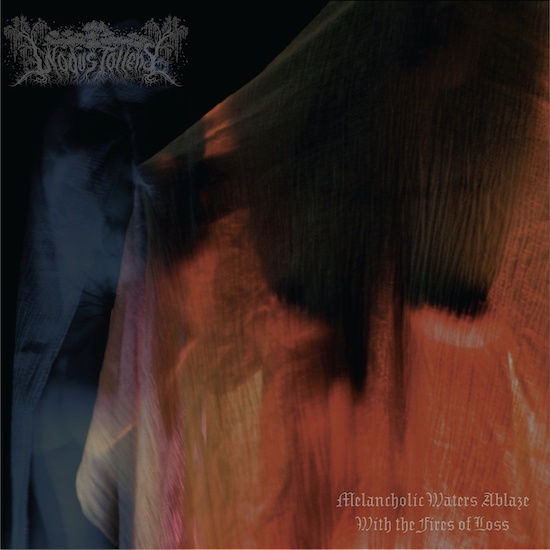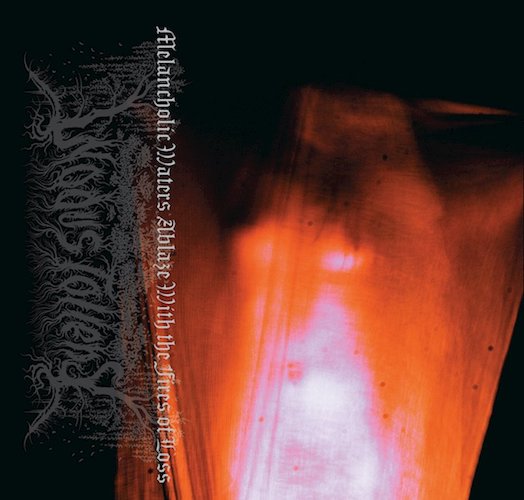
Nodus Tollens n. the realization that the plot of your life doesn’t make sense to you anymore — that although you thought you were following the arc of the story, you keep finding yourself immersed in passages you don’t understand, that don’t even seem to belong in the same genre — which requires you to go back and reread the chapters you had originally skimmed to get to the good parts, only to learn that all along you were supposed to choose your own adventure.
– The Dictionary of Obscure Sorrows
That definition tells you more than you might guess about the debut album of the band who took the phrase as its name. The title of that album, Melancholic Waters Ablaze with the Fires of Loss, is another significant clue. As that title suggests, and as the band’s lone member Cicatrix has described, the album was created “as an emotional exorcism, and the lyrics reflect it, dealing with grief, broken relationship, and ultimately hope, each in their turn”.
The musical expression of such emotions is of course not unique to Nodus Tollens, but as you’ll discover today through our premiere of the complete album, the manner of expression is unusual, the emotional power of the music is penetrating, and the flow of styles and moods, both within each song and among them, is enthralling.

The album will be jointly released on July 7th by Trepanation Recordings and Pacific Threnodies. As mentioned, it’s the first full-length by this Indiana-based project, though the second release overall, following a sold-out split with Crown of Asteria. Stylistically, it’s tethered to depressive and atmospheric black metal, but those bonds are loose ones, reflecting the diversity of Cicatrix’s interests.
For example, the music reflects an early ’90s alt-rock influence — Cicatrix suggests that it sounds like Woods of Desolation crossed with Superchunk or Dinosaur Jr. There are also moments when you can detect the influence of Neil Young and Godspeed You! Black Emperor. Fans of Falls of Rauros, Woods of Ypres, or Nemorensis should find much to enjoy here. But you’ll also encounter a monastic chant of exorcism, beguiling acoustic guitar instrumentals with a haunting backwoods resonance, and an utterly entrancing violin performance. And there’s a bit of good singing to go along with the blackened rasps and howls.
The music is beautiful and sad — sometimes very intense in its channeling of despair — and it’s bracing and uplifting as well, though its hopefulness always seems tenuous, as hope always does when you’ve been subjected to a multitude of hard lessons. It’s easy to lose yourself in the album, and to stay lost in it, because it never drags and because there always seems to be some arresting change just around the corner.
At this point, if you haven’t already done so, feel free to dive into the music. But if you have the patience for it, I’ve also included below the music player my impressions of each track, paired with italicized excerpts I’ve selected from Nodus Tollens‘ own track-by-track commentary.
Cassettes: from Pacific Threnodies will release the album on cassette tape, in an edition of 77 with blue shells (includes a sticker and button). Trepanation Recordings will release it on CD, in an edition of 50 with a cardboard slipcase. The artwork was created by Jeri Mize.
PRE-ORDER:
https://pacificthrenodies.bandcamp.com/album/melancholic-waters
https://trepanationrecordings.bandcamp.com/album/melancholic-waters-ablaze-with-the-fires-of-loss
NODUS TOLLENS:
https://www.facebook.com/ntdsbm
Melancholic Waters
This relatively brief intro track presents the sound of water, and of a man yelling, and then a slow movement of haunting reverberating notes over shrill shining tones. The mesmerizing but uneasy union of these sounds seems to produce feelings of gloom and despair, and it ends with a woman speaking.
“Once I decided on the album’s title, I knew I wanted it to open with the sound of water. The samples are from my favorite scene in Jean-Luc Godard’s Pierrot le Fou, with the wonderful Anna Karina (who died while I was working on the record) and Jean-Paul Belmondo. I love this exchange so much I have it tattooed on my forearm: “Pourquoi t’as l’air triste?” “Parce que tu me parles avec des mots… que moi je te regarde avec des sentiments.” (Why do you look sad? Because you talk to me with words … and I look at you with feelings.)
Hexenwald || Wölfinninwald
The first full song, and quite a kaleidoscopic experience. Initiated by thundering drums and frantic riffing, pierced by rapid flares of desperate and crazed fretwork, the music then sharply shifts into a mix of wistful acoustic and steel guitar melody with a backwoods flavor. Through whirling tremolo’d riffing and tumbling drums, the music builds again, and acidic gasps emerge in the distance. There’s an almost dreamlike quality to this phase of the song, but the guitar lead that surfaces creates a feeling of tension…
…and then it shifts again, with raking chords and scorching screams magnifying the tension in the music to the point of turmoil. Another shift occurs, leading into the ghostly, channel-shifting echo of gleaming notes. And then the drums begin to pound and rumble again, the vocals to erupt in flesh-flensing shrieks, and the riffing to pulsate in a semblance of building anguish.
“The title translates as ‘Witch Forest || She-Wolf Forest.’ I have to give a tip of the hat to Murul from Blyh for giving me ‘Wölfinninwald,’ which is much cooler than the word I was originally going to use.
“Seeing the word ‘wolf’ in a black metal context makes some people flinch, and for good reason. There are a lot of fascist shitheads who have co-opted wolfen imagery for their hate groups. For example: völkisch ‘strength cult’ Operation Werewolf. Unfortunately, someone with whom I’d been close got involved with them. After we quit talking, I spent… probably too long trying to figure out if I’d missed any indications that she was going to break that way. The more I thought, the angrier I got – this is the end result.
“I had planned all along for it to be the first ‘real’ song on the record, since it was so emotionally charged. It ended up being the last one I finished; however, I wrote the first riff really early in the process. It sounded different than anything else I’d been writing – a little techy, kind of angular – and had a bit of a Crown of Asteria vibe to it. I messaged Meghan Wood and asked if she’d play a skronky guitar solo over it. She said yes, and then proceeded to absolutely fucking kill it.”
Willowing
The song welcomes us with a slow moody guitar melody, joined by a second guitar to create a doleful harmony. The emotional intensity builds, with the second guitar seeming to cry out in grief. As the drum begins to pound and the harsh whispered vocals come in, the riffing becomes feverish in its expression of melancholia, followed by a beautiful though still very sad guitar instrumental. The melody works its way under the skin, entrancing in its effect but also beleaguered in its mood.
The drums return as does the desolate fever in the riffing — and the entrancing melody returns as well. The music briefly falls silent, and returns with another inward-facing dual-guitar harmony that seems to moan and weep — so beautiful but cut from rent and tear-stained cloth.
“The three-minute guitar solo was unexpected, but I think the Neil Young (and to a lesser extent, J Mascis) influences took over. I’m not necessarily saying it’s on the same level as something like ‘Cortez the Killer,’ but I do think it has a similar narrative quality in the way it unfolds. I’d like to say I planned it that way, but I’d be lying…. [M]usically it ended up sounding much more hopeful than I was expecting. After I finished writing it, the album started to take on a decidedly more optimistic tone. I still think it’s a sad record, but there’s also a lot of potential for light in there.”

Ursa Majora
This is the beginning of a two-song mini-suite that concludes with “Ursa Minora“. Each one of them is excellent; together they are stunning. Here, you’ll encounter vibrant thumping drums and the rapid vibration of lilting riffage with an almost buoyant mood, edged by the harsh shrieks. The song’s rocking beats and rocking chords also sound vibrant and hopeful, creating a riveting feeling of defiance.
But change is a hallmark of the record, and so the song switches into a more dreamy and contemplative melody, becomes energized again, and then changes again — to a bright, folk-like acoustic guitar melody backed by gut-punching and head-snapping drumwork. A voice speaks as the music falls silent, but with a whine of feedback the song morphs again. The drums begin a vigorous pounding and the guitars swirl and soar in scintillating fashion, creating a heart-swelling sensation that’s nevertheless shadowed by feelings of yearning and futility.
“The ‘Ursa‘ songs were written for a very dear friend who suffered a tragedy while I was working on the album…. ‘Majora‘ was inspired by my very dear friend’s tattoo that reads ‘With Pain Comes Strength,’ pictured on the inside of the j-card and on the back of the CD sleeve. I told her she was likely strong enough now and wrote the rest of the lyrics around that sentiment…. The sample is Larry Levis, reading from his poem “Winter Stars.” The image seemed appropriate for the song, even though the poem’s themes are totally different from what I was writing about.”
Ursa Minora
This entire song is an irresistible spell. The ringing dual acoustic guitar melody is spectral and spellbinding, a woodland meditation that seems to be the soundtrack to memories of better days and the regret of losing them. The volume of the music swells, and a sombre drum rhythm joins in as a prelude to a gorgeous violin melody performed by Andrea Morgan (Exulansis) that occupies the bulk of the track, one that’s completely entrancing but also gloriously heart-breaking, the kind of experience in which it’s easy to lose yourself – or rather to be led by it into the haunted places where your own sorrows dwell.
“I asked my friend Andrea Morgan of Exulansis, whose most recent album Sequestered Sympathy is devastatingly brilliant, to add violin to it. She really elevated the second half – I think it has a cinematic feel similar to Godspeed You! Black Emperor….”
Ad Meliora
At first you hear echoing voices with the reverent sound of monastic chants beneath high gothic arches, eventually subsumed by a growing, searing sound. The the music becomes much heavier and more intense thanks to a growling bass rhythm and filaments of guitar dissonance, which have the resonance of fracturing emotions and dissipating sanity. The reverberating guitars slowly wail, and after a moment of silence, acoustic and steel guitars arise over the sound of a bowing bass, their voices becoming hopeful once again, but with one foot left in that place across the line where sorrow reigns.
The song includes clean-sung vocals that wouldn’t be out of place in an alt-rock ballad, as well as quivering guitars that create a hallucinatory but seductive atmosphere over head-nodding drum patterns. Those searing sounds reappear as a bridge to a lonesome yet wondering melody, framed with a backdrop of light abrasion (with gasping vocals), and a final offering of slow backwoods acoustic melody
“I knew from the start I wanted to end the album on a hopeful note, which is why this is the last full song: ‘Semper ad Meliora’ is Latin for ‘Always Towards Better,’ which felt like a very appropriate way to conclude the thematic arc. I circled back to the idea of an ‘emotional exorcism’ with the chanting that opens the track, which is an actual exorcism prayer – the St. Benedict Medal Prayer of Exorcism. It ended up being a fun song to put together.
“I took a lot of stylistic risks on this song, particularly in that first section where I was going for a more industrial sound with the heavy bass, minimalist riff, and gated drums. The clean vocals were a spontaneous decision I made while writing the lyrics, which I think are the strongest on the album. There are two bits I especially like: “A language of symbols / with too many ways to say ‘empty’ / and none to say ‘love,’” and “In the absence of light / we deify our sadness.”
The Fires of Loss
And now the end — a glistening, ethereal guitar harmony whose multiple layers give it multiple emotional textures – a conjoining of dejection, pain, and even hints of resilience — and spoken words.
“Since I started things off with water, I wanted the album to end with fire. Structurally, the song is pretty similar to “Melancholic Waters.” The clean guitar part is a bit more intricate, and I used an EBow for the not-exactly-a-melody line. The sample on this one is an excerpt from Zachary Schomburg reading his poem ‘The Fire Cycle.'”

Your words so well describe the song to song experience. good call on the neil young and crazy horse, may I add a hint of built to spill..?
This is SWEET blackened garage !
Thank you.
This is the first time I’ve ever seen a Dinosaur Jr reference at NCS. Must be interesting.